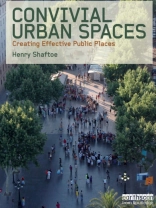Despite developments in urban design during the last few decades, architects, urban planners and designers often continue to produce areas of bland, commercially led urban fabric that deliver the basic functional requirements of shelter, work and leisure but are socially unsustainable and likely generators of future problems.
Convivial Urban Spaces demonstrates that successful urban public spaces are an essential part of a sustainable built environment. Without them we are likely to drift into an increasingly private and polarized society, with all the problems that would imply. Taking a multidisciplinary approach, this book draws on research, and the literature and theory of environmental psychology and urban design, to advance our understanding of what makes effective public spaces. Practical guidance is illustrated with case studies from the UK, Spain, Germany and Italy. The result is a practical and clearly presented guide to urban public space for planners, architects and students of the urban environment.












